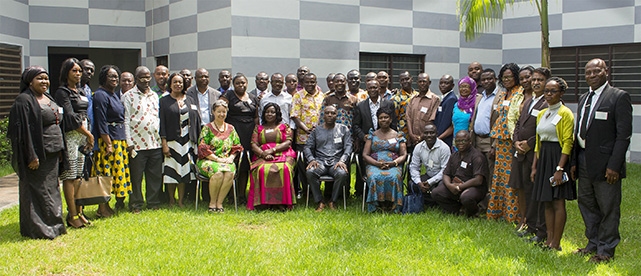 procurement opportunities
procurement opportunities
 documents and reports
documents and reports
MiDA PILOTS ENERGY EFFICIENCY PROJECT IN 30 SCHOOLS

The Millennium Development Authority (MiDA) is piloting an energy efficiency project in 30 schools in the Greater Accra, Ashanti and Northern regions to influence a change in behaviour towards energy efficiency and conversation at the pre-tertiary level.
MiDA, through its Energy Efficiency and Demand Side Management Project, seeks to incorporate energy efficiency and conservation into Ghana’s pre-tertiary curriculum.
This would ensure that teachers, students and the public develop the right behavioural and attitudinal change to ensure sustainable use of energy both in school and at home.
The project, in collaboration with Associates for Change, Ministry of Education (MoE), National Council for Curriculum and Assessment (NaCCA) and Ghana Education Service (GES) is being piloted in six districts in the three regions.
Mr Mawunyo Rubson, the Director, Generations Project, MiDA, who read a speech on behalf of the Chief Executive Officer at a workshop in Accra, said the project marked an important milestone in enhancing teaching and learning in pre-tertiary education, while making school curriculum responsive to global efforts at enhancing energy efficiency and mitigating climate change.
It was dubbed: “Energy Efficiency and Conservation - Pre-Tertiary School Curriculum Update.”
He said: “The energy situation in Ghana today calls for concerted and pragmatic measures at making sure that the Ghanaian public is energy efficient in cutting down wastage in the use of available capacity.”
“This way government reduces on its annual investment in expensive power generation infrastructure and it is able to manage development needs in other sectors of the economy more effectively.”
“In addition to rigorous public education campaign and outreach programmes, an effective way to complementing efforts at achieving an Energy Efficient Ghanaian Public is to catch them young’ whilst they are in school.”
Mr Rubson said the project was on pilot basis, funded under the Millennium Challenge Compact, and would be rolled as a national programme in all pre-tertiary institutions when tested and evaluated successfully.
Dr Leslie Casely-Hayford, the Team Leader, Associates for Change, said a needs assessment would be conducted for the pupils and students in the randomly selected schools on energy efficiency and conservation adding that energy clubs to empower the students would be introduced to influence behavioural change.
Mrs Felicia Boakye-Yiadom, the Acting Executive Secretary, NaCCA, said the Council had undertaken curriculum audit and found out that there were gaps in energy efficiency and conservation, which needed to be addressed in all schools in the country through the curriculum.
She said the audit identified that although the Natural Science at the primary school, and Integrated Science at the junior and senior high schools had a lot of concepts and topics on energy, much had not been covered with respect to energy saving, conservation and efficiency.
“’We are going to train teachers to be able to change the way of teaching in the classroom that will affect the behaviour of students. It is not about imbibing knowledge but engaging in activities that will influence the behaviour of the children towards conserving energy and energy efficiency,’’ she said.
Mrs Boakye-Yiadom said training manuals and materials, including posters, would be made available for teachers to use in the classroom.
Mr Divine Ayidzoe, the Director in-charge of Statistics, Research, and Information Management, MoE, said the Ministry was committed to supporting the project to its fruition by 2020.
The workshop was attended by energy experts, GES officials, representatives from the MoE, head teachers and other key stakeholders.
Source: GNA
Newsletter
- 2nd December, 2019MiDA Newsletter, Vol 3 Issue 2
- 29th March, 2019MiDA Newsletter, Vol 3 Issue 1
- 30th September, 2018MiDA Newsletter, Vol 2 Issue 4
- 29th June, 2018MiDA Newsletter, Vol 2. Issue 3
- 30th March, 2018MiDA Newsletter, Vol. 2 Issue 2
- 29th December, 2017MiDA Newsletter, Vol. 2 Issue 1
- 30th June, 2017MiDA Newsletter, Vol.1 Issue 4
- 16th December, 2016MiDA Newsletter, Vol.1 Issue 3
- 30th June, 2016MiDA Newsletter, Vol.1 Issue 2
- 1st February, 2016MiDA Newsletter, Maiden Edition
Stakeholder Consultations
Workshops
- 22nd March, 2017MiDA/MCC PROCUREMENT GUIDELINES WORKSHOP HELD
- 9th September, 2015SECOND POLICY DECISION MAKERS WORKSHOP FOR PSP TRANSACTION IN ECG
- 1st January, 1970Development and Enforcement of Standards and Labels Activity
- 1st January, 1970Improved Energy Auditing Activity
- 1st January, 1970Education and Public Information Activity
- 1st January, 1970Demand Side Management Infrastructure Activity
 Outreach
Outreach
